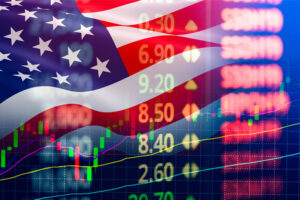How can the elections in the US and Taiwan affect our investments?
Donald Trump won the primary elections in Iowa, and in Taiwan, a supporter of the island's independence once again became the new president. But this is not the end, because this year we will have elections in countries representing 80 percent. capitalization of world stock exchanges. At this point, it is worth considering: How can choices affect our investments?
Migration crisis and recovery from recession
Elections is a word that will be used especially often this year. This is because voting will take place in over 40 countries, representing over 40%. world economy. Stock exchanges from these countries are responsible for as much as 80%. world capitalization (60% of the capitalization of world stock exchanges is in the USA). We see for ourselves that elections can bring surprises and serious political consequences by observing the difficult process of changes after the October elections in Poland. The elections may also affect stock markets, quotations of individual companies and indices, as well as changes in currency rates. For example, since the October 16 elections, WIG index gained 12 percent.
However, this is not the end of voting in Poland, because in April we will have local elections (in two rounds on April 7 and 21), and in June - elections to the European Parliament. They will take place across the European Union, at a time when populists are on the rise in some countries. They will have a much larger representation in the new parliament than before, which will create additional pressure on European institutions, especially in the context of important challenges such as: the migration crisis, recovering from the recession, improving the competitiveness of the European economy and discussing changes to the decision-making mechanism in the EU.
Trump wins the primaries
Among this year's important elections in the world, we already have the ones in Taiwan behind us. On January 13, millions of citizens of the country that is the largest semiconductor producer elected their president for the next 4 years. It was Lai Ching-te, the current vice president from the Democratic Progressive Party (DPP). He is in favor of a continuation of the island's current policy of independence towards China, which increases tensions with Beijing. And it also inflames relations between China and the US. At the same time, none of the parties won an independent majority in parliament, which means the need to build a coalition and causes additional uncertainty.
This year, the US elections will be very important. On Monday, Donald Trump won the Republican primary in Iowa by a huge margin. The campaign before the elections will be very hot and long, because the elections will take place only in 11 months - on November 5. On this day, Americans will elect not only the president, but also the entire House of Representatives and 1/3 of the Senate.
The market is pricing in a realistic scenario
Currently, when the level of geopolitical risk in the world is at an all-time high and populist forces are increasingly achieving good results in elections, the impact of elections on stock exchanges and our investments may be more significant than usual. We should remember that the market usually prices the most realistic scenario and takes into account the likelihood of alternative scenarios. However, in the case of politics, support for particular parties and candidates, the dynamics of their changes may be higher than in the case of economic data, whose influence on the stock exchange we usually observe. Much depends on individual countries and their political systems. And in developed democracies with well-established institutions (at least theoretically), the impact of election results should be less than in other countries.
It is also worth using historical data in such analyses. In the USA since its inception S & P500 index in 1928, presidential elections were held 24 times. During these years, the S&P 500 produced positive returns 20 of 24 times (83 percent of the time). When a Democrat was in office and a Democrat was elected, the total annual return averaged 12 percent. And when a Republican won and the incumbent president was a Democrat, markets gained an average of 13 percent annually.
About the author
 Pawel Majtkowski - analyst eToro on the Polish market, which shares its weekly commentary on the latest stock market information. Paweł is a recognized expert on financial markets with extensive experience as an analyst in financial institutions. He is also one of the most cited experts in the field of economy and financial markets in Poland. He graduated from law studies at the University of Warsaw. He is also the author of many publications in the field of investing, personal finance and economy.
Pawel Majtkowski - analyst eToro on the Polish market, which shares its weekly commentary on the latest stock market information. Paweł is a recognized expert on financial markets with extensive experience as an analyst in financial institutions. He is also one of the most cited experts in the field of economy and financial markets in Poland. He graduated from law studies at the University of Warsaw. He is also the author of many publications in the field of investing, personal finance and economy.






















![Forex Club – Tax 9 – Settle tax on a foreign broker [Download the Application] Forex Club - Tax 9](https://forexclub.pl/wp-content/uploads/2024/02/Forex-Club-Podatek-9-184x120.jpg?v=1709046278)
![Trading View platform – solutions tailored to the needs of traders [Review] trading view review](https://forexclub.pl/wp-content/uploads/2024/03/trading-view-recenzja-184x120.jpg?v=1709558918)
![How to connect your FP Markets account to the Trading View platform [Guide] fp markets trading view](https://forexclub.pl/wp-content/uploads/2024/02/fp-markets-trading-view-184x120.jpg?v=1708677291)
![STI 30 – Singapore Stock Exchange – Does a great country also mean a great index? [Guide] singapore stock exchange sti 30 singapore](https://forexclub.pl/wp-content/uploads/2024/05/singapurska-gielda-sti-30-singapur-184x120.jpg?v=1715232642)
![CRB index – one of the popular commodity market benchmarks [Guide] crb index](https://forexclub.pl/wp-content/uploads/2024/05/indeks-crb-184x120.jpg?v=1715055656)
![How to invest in ChatGPT and AI? Stocks and ETFs [Guide] how to invest in chatgpt and artificial intelligence](https://forexclub.pl/wp-content/uploads/2023/02/jak-inwestowac-w-chatgpt-i-sztuczna-inteligencje-184x120.jpg?v=1676364263)






![Izabela Górecka – “Success on the market depends not only on knowledge, but also on emotional stability” [Interview] Izabela Górecka - interview](https://forexclub.pl/wp-content/uploads/2024/04/Izabela-Gorecka-wywiad-184x120.jpg?v=1713870578)
![WeWork – the anatomy of the collapse of a company valued at $47 billion [WeWork, part II] wework bankruptcy story](https://forexclub.pl/wp-content/uploads/2024/04/wework-bankructwo-historia-184x120.jpg?v=1711729561)
![Adam Neumann – the man who screwed up Softbank [WeWork, part AND] adam neumann wework](https://forexclub.pl/wp-content/uploads/2024/04/adam-neumann-wework-184x120.jpg?v=1711728724)
![The most common mistakes of a beginner trader - Mr Yogi [VIDEO] Scalping - The most common mistakes of a beginner trader - VIDEO](https://forexclub.pl/wp-content/uploads/2024/03/Scalping-Najczestsze-bledy-poczatkujacego-tradera-VIDEO-184x120.jpg?v=1711601376)
![Learning patience: No position is also a position - Mr Yogi [VIDEO] Scalping - Learning patience - No position is also a position - VIDEO](https://forexclub.pl/wp-content/uploads/2024/03/Scalping-Nauka-cierpliwosci-Brak-pozycji-to-tez-pozycja-VIDEO-184x120.jpg?v=1710999249)
![When to exit a position and how to minimize losses - Mr Yogi [VIDEO] Scalping - When to exit a position and how to minimize losses - VIDEO](https://forexclub.pl/wp-content/uploads/2024/03/Scalping-Kiedy-wyjsc-z-pozycji-i-jak-minimalizowac-straty-VIDEO-184x120.jpg?v=1710336731)











Leave a Response